Jules Feiffer: Jules Ralph Feiffer, born on January 26, 1929, is an American cartoonist and author celebrated as one of the most widely-read satirists in the United States. His illustrious career has earned him numerous accolades, including the Pulitzer Prize in 1986 for his editorial cartoonist work and induction into the Comic Book Hall of Fame in 2004. Feiffer’s creative talents span many mediums, from comics to plays, screenplays, children’s books, and beyond, leaving an indelible mark on American culture.
Jules Ralph Feiffer
Date of Birth: January 26, 1929
Occupation: Cartoonist and Author
Notable Achievements:
- Won the Pulitzer Prize in 1986 as the United States’s leading editorial cartoonist.
- Inducted into the Comic Book Hall of Fame in 2004.
- Wrote the animated short “Munro,” which won an Academy Award for Best Animated Short Film in 1961.
- Recognized by the Library of Congress for his remarkable legacy, spanning from 1946 to the present, as a cartoonist, playwright, screenwriter, adult and children’s book author, illustrator, and art instructor.
Early Life
Jules Ralph Feiffer was born in The Bronx, New York City, on January 26, 1929, to David Feiffer and Rhoda (née Davis). He grew up in a Jewish household with a younger and an older sister. Feiffer’s father worked as a salesman but often faced unemployment due to the Depression, while his mother was a fashion designer who made watercolor drawings of her designs. Feiffer’s early interest in drawing was encouraged by his mother, who always supported his artistic endeavors. He began drawing at the age of 3 and received a drawing table for his bedroom when he was 13. His mother also enrolled him in the Art Students League of New York to study anatomy. Feiffer graduated from James Monroe High School in 1947.
He developed a fascination with cartoons and comic strips from a young age and was particularly drawn to the way they told stories, creating unique and fantastical worlds.
Career
Cartoonist
Feiffer’s career as a cartoonist began when he became an assistant to cartoonist Will Eisner in the mid-1940s when he was just 17 years old. At Eisner’s studio, he initially did tasks such as erasing and cleanup. However, he quickly demonstrated his talent for writing and soon started working on dialogues for Eisner’s comic strips, including “The Spirit.” Over time, he took on more responsibilities and eventually began creating stories entirely on his own. His collaboration with Eisner was characterized by shared ideas, arguments, and creative changes.
In 1956, Feiffer joined The Village Voice as a staff cartoonist, where he produced a weekly comic strip titled “Feiffer.” His cartoons became nationally syndicated in 1959, appearing in various publications, including the Los Angeles Times, The New Yorker, Playboy, Esquire, and The Nation. In 1997, he created the first op-ed page comic strip for The New York Times, which ran monthly until 2000.
Author
Beyond his work as a cartoonist, Jules Feiffer has written more than 35 books, plays, and screenplays. He published his first collection of satirical cartoons, “Sick, Sick, Sick,” in 1958, followed by his first novel, “Harry, the Rat With Women,” in 1963. Feiffer also wrote “The Great Comic Book Heroes” in 1965, which was the first history of comic-book superheroes of the late 1930s and early 1940s. His work expanded to graphic novels, with “Tantrum” in 1979, and books aimed at young readers, several of which have received awards.
Playwright and Screenwriter
Feiffer’s talents extended to the theater and film. He wrote plays like “Little Murders” (1967), “Feiffer’s People” (1969), and “Knock Knock” (1976). His screenplay for “Carnal Knowledge” (1971), directed by Mike Nichols, and “Popeye” (1980), directed by Robert Altman, earned him recognition in the film industry. He was honored with a Lifetime Achievement Award by the Dramatist’s Guild.
Art Instructor
Feiffer has also shared his knowledge and passion for art and storytelling as an art instructor. He has taught at institutions like the Yale School of Drama and Northwestern University. He has been a Senior Fellow at the Columbia University National Arts Journalism Program and was in residence at the Arizona State University Barrett Honors College.
Personal Life
Jules Feiffer has been married three times and has three children. His daughter Halley Feiffer is an actress and playwright, while another daughter, Kate Feiffer, is an author and playwright. In September 2016, he married freelance writer JZ Holden in a ceremony that combined Jewish and Buddhist traditions. Jules Feiffer currently resides in upstate New York with his wife and their three cats, Mimi, Jackson, and Dezzdemona. He is currently working on a visual memoir.
Career
Playwright, cartoonist, and author/illustrator. Assistant to cartoonist Will Eisner, 1946-51; drew syndicated cartoon series “Clifford,” 1949-51; held various art jobs, 1953-56, including making slide films, as a writer for Terrytoons, and as a designer of booklets for an art film; freelance cartoonist, with work published in Village Voice, New York, NY, 1956-97, in Observer, London, England, 1958-66, 1972-2000, and in Playboy,1959–; cartoons syndicated by Publishers-Hall Syndicate and distributed to more than one hundred newspapers in the United States and abroad, 1956-2000.
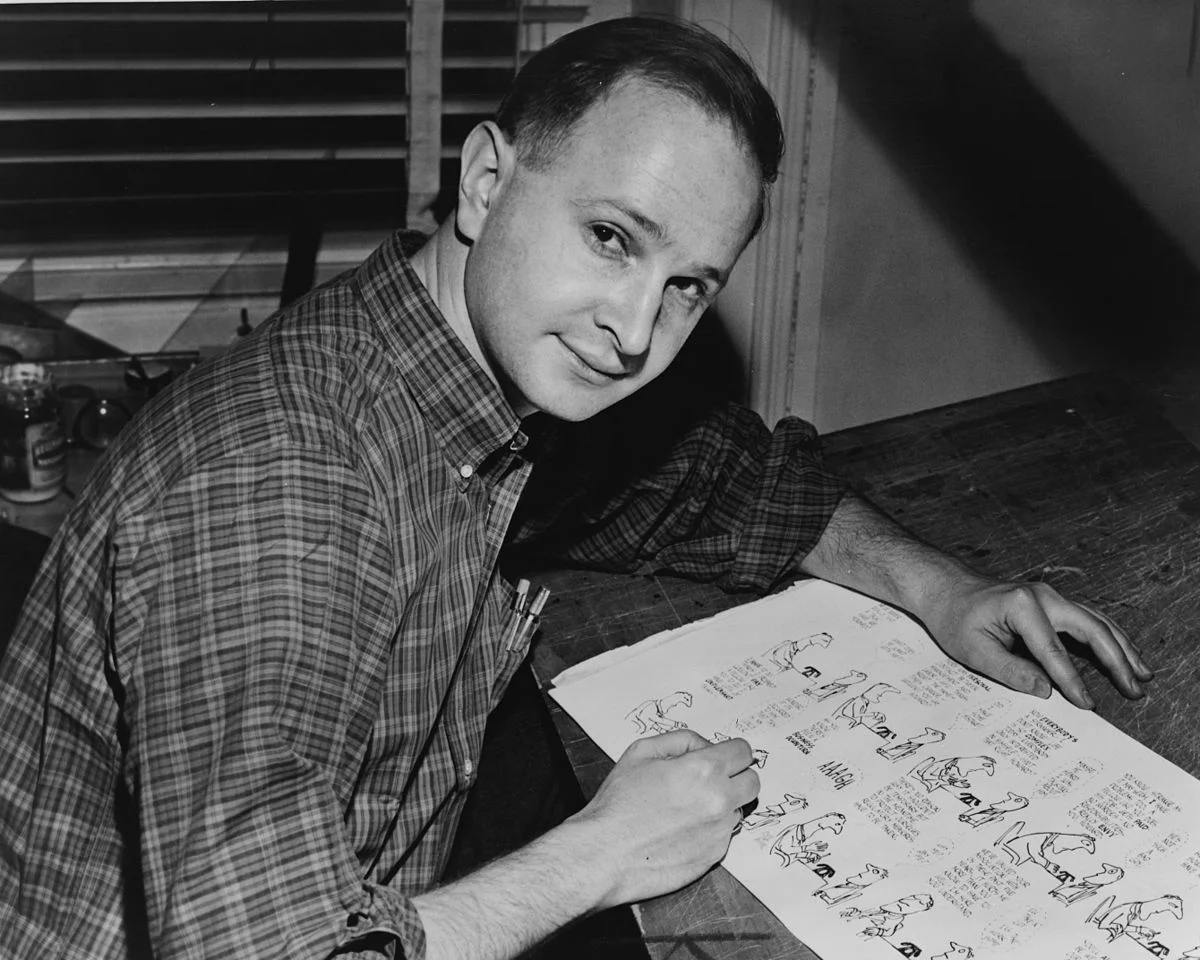
Member of faculty at Yale University School of Drama, 1972-73, Northwestern University, 1996, and Southampton College, 1999–; senior fellow of national arts journalism program, Columbia University, 1997. Exhibitions: Retrospective staged at the University of Wisconsin-Milwaukee, 2003. Military service: U.S. Army, Signal Corps, 1951-53; worked in the cartoon-animation unit.
Member
Authors League of America, Dramatists Guild (a member of council), PEN, Writers Guild of America, East.
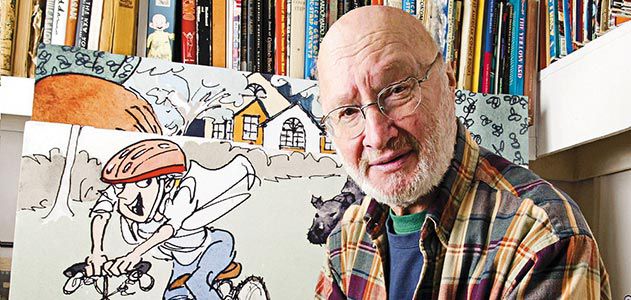
Awards, Honors
Academy Award for Best Short-Subject Cartoon, Academy of Motion Picture Arts and Sciences, 1961, for Munro; Special George Polk Memorial Award, 1961; most promising playwright, New York Drama Critics, 1966-67, Best Foreign Play of the Year, London Theatre Critics, 1967, and Outer Critics Circle Award, and Off-Broadway Award, Village Voice, both 1969, all for Little Murders;
Outer Critics Circle Award, 1970, for The White House Murder Case; Pulitzer Prize, 1986, for editorial cartooning; best screenplay honor, Venice Film Festival, 1989, for I Want to Go Home; elected to American Academy of Arts & Letters, 1995; honorary D.H.L., Long Island University, 1999; Red Colver Children’s Choice Picture Book Award, 2000, for Bark, George; Milton Caniff Lifetime Achievement Award, National Cartoonists Society, 2003; Ian McLellan Hunter Award for Lifetime Achievement in Writing, Writers Guild of America, East, 2004; Harold Washington Literary Award, 2004; Patricia A. Barr Shalom Award, Americans for Peace Now, 2004.
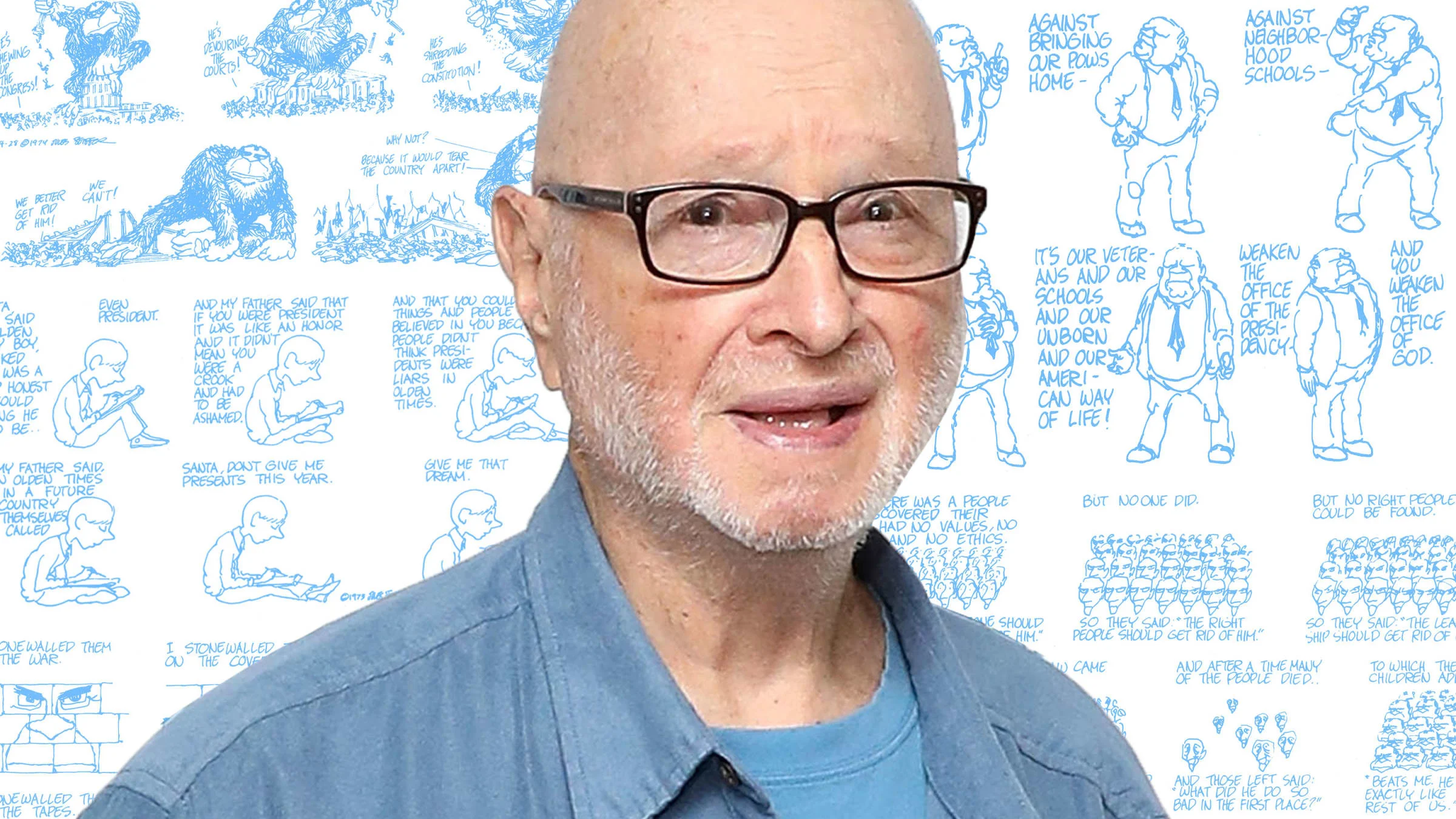
Writings
FOR CHILDREN; SELF-ILLUSTRATED
(Illustrator) Norton Juster, The Phantom Tollbooth, Random House (New York, NY), 1961, published with an appreciation by Maurice Sendak, Random House (New York, NY), 1996.
The Man in the Ceiling, HarperCollins (New York, NY), 1993.
A Barrel of Laughs, a Vale of Tears, Harper Collins (New York, NY), 1995.
Meanwhile . . . , HarperCollins (New York, NY), 1997.
I Lost My Bear, Morrow (New York, NY), 1998.
Bark, George, HarperCollins (New York, NY), 1999.
(Illustrator) Florence Parry Heide, Some Things Are Scary, Candlewick Press (Cambridge, MA), 2000.
I’m Not Bobby!, Hyperion (New York, NY), 2001.
By the Side of the Road, Hyperion (New York, NY), 2002.
The House Across the Street, Hyperion (New York, NY), 2002.
The Daddy Mountain, Hyperion (New York, NY), 2004.
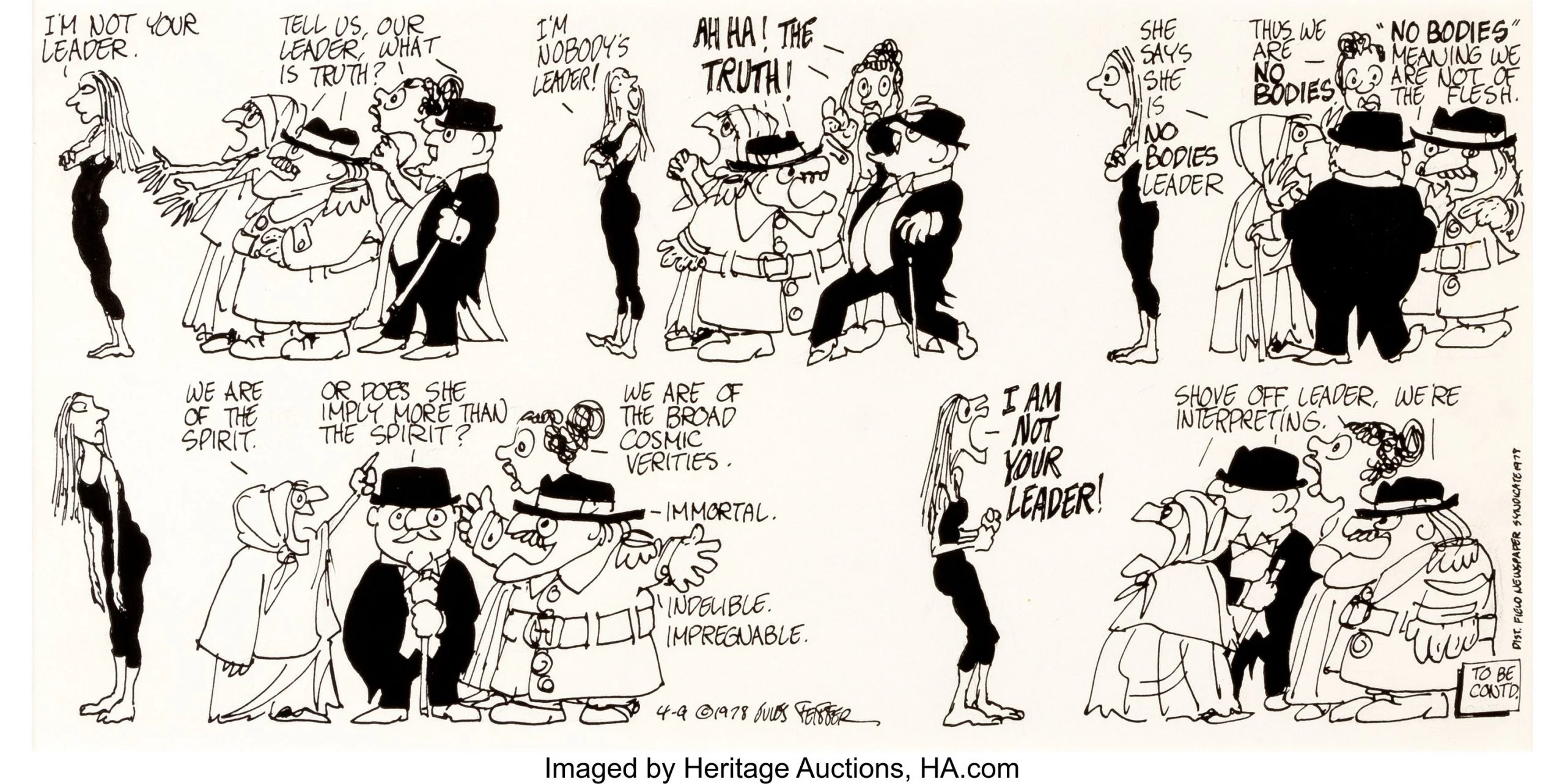
FOR ADULTS; CARTOONS, UNLESS OTHERWISE NOTED
Sick, Sick, Sick: A Guide to Non-confident Living, McGraw (New York, NY), 1958, with an introduction by Kenneth Tynan, Collins (London, England), 1959.
Passionella and Other Stories, McGraw (New York, NY), 1959.
(Illustrator) Robert Mines, My Mind Went All to Pieces, Dial (New York, NY), 1959.
The Explainers, McGraw (New York, NY), 1960.
Boy, Girl, Boy, Girl, Random House (New York, NY), 1961.
Feiffer’s Album, Random House (New York, NY), 1963.
Hold Me!, Random House (New York, NY), 1963.
Harry, the Rat with Women (novel), McGraw (New York, NY), 1963.
(Compiler and annotator) The Great Comic Book Heroes, Dial (New York, NY), 1965, revised edition, Fantagraphics Books (Seattle, WA), 2003.
The Unexpurgated Memories of Bernard Mergendeiler, Random House (New York, NY), 1965.
The Penguin Feiffer, Penguin (London, England), 1966.
Feiffer on Civil Rights, Anti-Defamation League (New York, NY), 1966.
Feiffer’s Marriage Manual, Random House (New York, NY), 1967.
Pictures at a Prosecution: Drawings and Text from the Chicago Conspiracy Trial, Grove (New York, NY), 1971.
Feiffer on Nixon: The Cartoon Presidency, Random House (New York, NY), 1974.
Ackroyd (novel), Simon & Schuster (New York, NY), 1977.
Tantrum: A Novel-in-Cartoons, Knopf (New York, NY), 1979.
Feiffer: Jules Feiffer’s America from Eisenhower to Reagan, Knopf (New York, NY), 1982.
Marriage Is an Invasion of Privacy, and Other Dangerous Views, Andrews & McMeel (Kansas City, MO), 1984.
Feiffer’s Children: Including Munro, Andrews & McMeel (Kansas City, MO), 1986.
Ronald Reagan in Movie America: A Jules Feiffer Production, Andrews & McMeel (Kansas City, MO), 1988.
Feiffer: The Collected Works, Volume 1, Fantagraphics Books (Seattle, WA), 1989.
Feiffer: The Collected Works, Volume 3, Fantagraphics Books (Seattle, WA), 1991.
Feiffer: The Collected Works, Volume 4, Fantagraphics Books (Seattle, WA), 1997.
Ghost-scripted comic-book series “The Spirit,” 1949-51. Contributor to periodicals, including Ramparts.
Feiffer’s books have been translated into German, Swedish, Italian, Dutch, French, and Japanese.
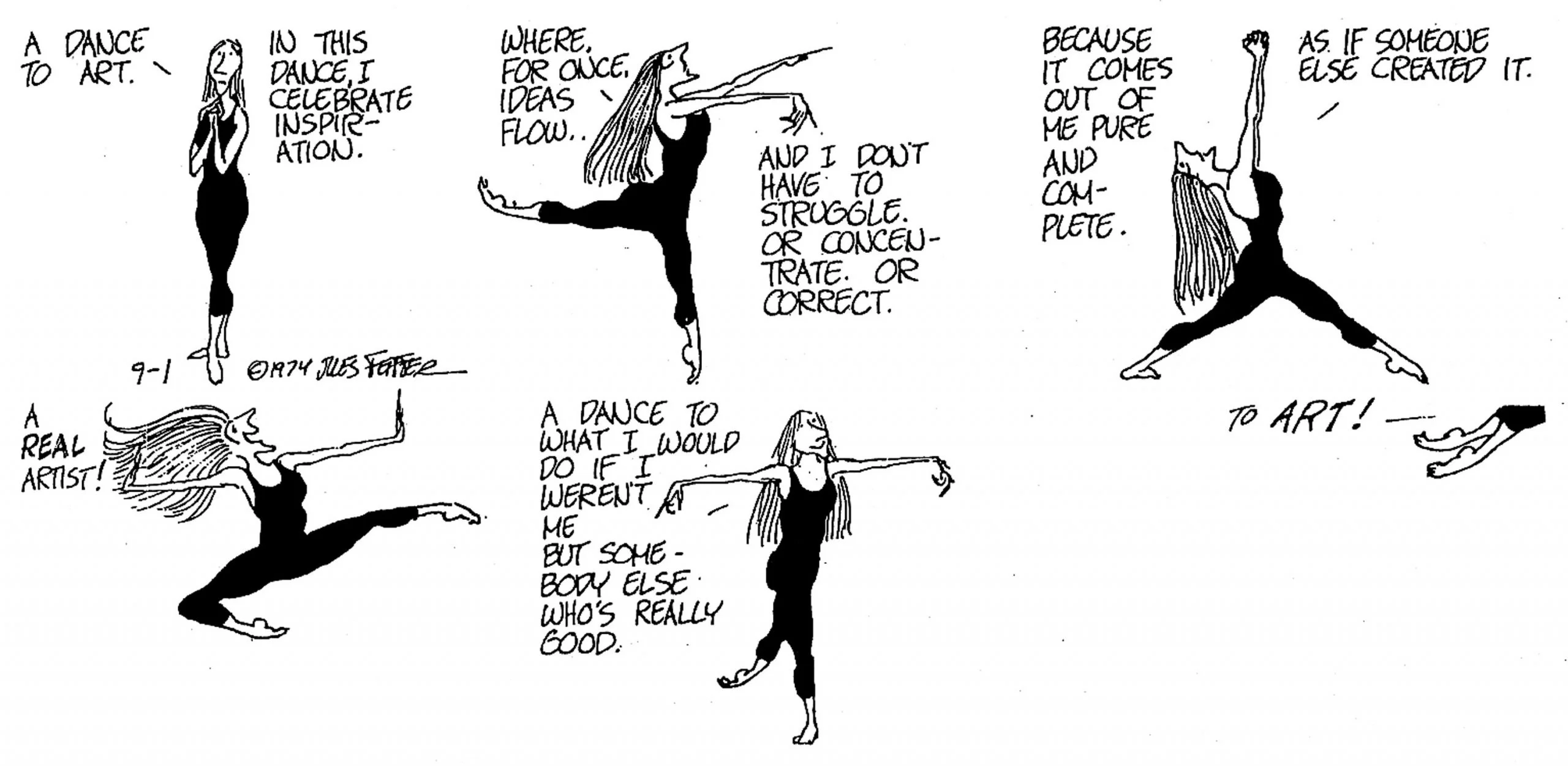
PLAYS
The Explainers (satirical review), first produced in Chicago, IL, 1961.
The World of Jules Feiffer, first produced in New Jersey, 1962.
Crawling Arnold (one-act; first produced in Spoleto, Italy, 1961; produced by WEAV-TV, 1963), Dramatists Play Service (New York, NY), 1963.
The Unexpurgated Memoirs of Bernard Mergendeiler (first produced in Los Angeles, CA, 1967; produced with other plays as Collision Course, off-Broadway, 1968), published in Collision Course, edited by Edward Parone, Random House (New York, NY), 1968.
Little Murders (two-act comedy; first produced on Broadway, 1967; produced by Royal Shakespeare Company in London, England, 1967; revived off-Broadway, 1969), Random House (New York, NY), 1968.
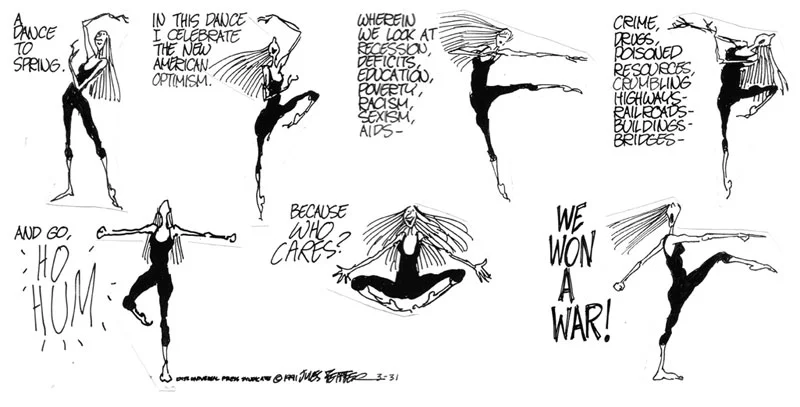
God Bless, first produced at Yale School of Drama, New Haven, CT, 1968; produced by Royal Shakespeare Company, 1968.
Dick and Jane: A One-Act Play (also see below; first produced in New York, NY, as part of Oh! Calcutta!, revised by Kenneth Tynan, 1969), published in Oh! Calcutta!, edited by Tynan, Grove (New York, NY), 1969.
The White House Murder Case: A Play in Two Acts [and] Dick and Jane: A One-Act Play (The White House Murder Case first produced in New York, NY, 1970), Grove (New York, NY), 1970.
Feiffer’s People: Sketches and ObservationsDramatists Play Service (New York, NY), 1969. (first produced in Edinburgh, Scotland, 1968; produced in Los Angeles, CA,)1971.
(With others) The Watergate Classics, first produced at Yale Repertory Theatre, 1973.
Knock-Knock (first produced in New York, NY, 1974), Hill & Wang (New York, NY), 1976.
Hold Me! (first produced in New York, NY, 1977), Dramatists Play Service (New York, NY), 1977.
Grown-ups (first produced in New York, NY, 1981), Samuel French (New York, NY), 1982.
A Think Piece, first produced in Chicago, IL, 1982.
Feiffer’s America, first produced in Evanston, IL, 1988.
Carnal Knowledge, first produced in Houston, TX, 1988.
Elliot Loves (first produced in Chicago, IL, 1988), Grove (New York, NY), 1990.
Anthony Rose, first produced in Philadelphia, PA, 1989.
E-mail (one-act play), first produced as part of Short Talks on the Universe, produced in New York, NY, 2002.
A Bad Friend, first produced in New York, NY, 2003.
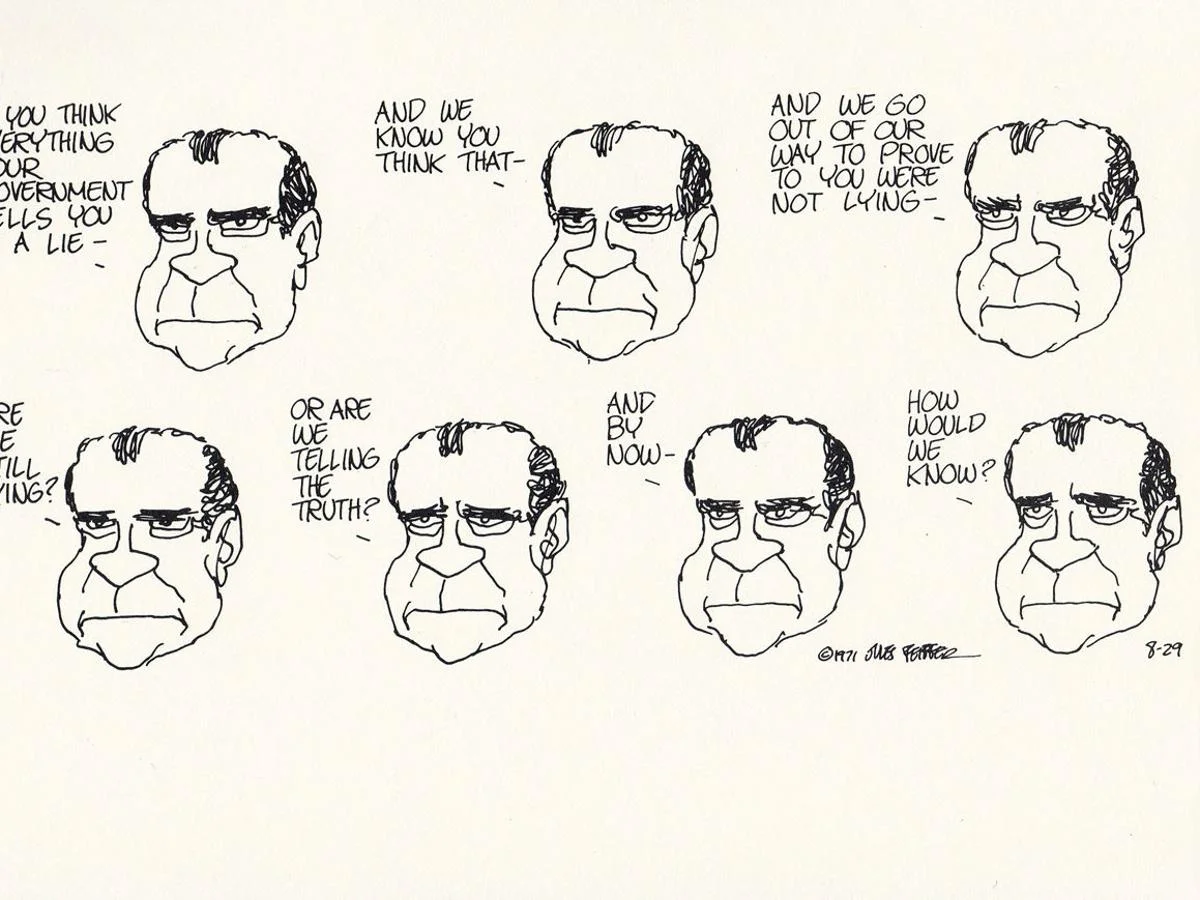
SCREENPLAYS
Little Murders, Twentieth Century-Fox, 1971.
(With Israel Horovitz) VD Blues (produced by Public Broadcasting Service, 1972), Avon (New York, NY), 1974.
Popeye, Paramount, 1980.
(Adapter) Puss in Boots, Columbia Broadcast System/Fox Video, 1984.
I Want to Go Home, Marvin Karmitz Productions, 1989.
Contributor of sketches to productions of DMZ Cabaret, New York; writer for Steve Allen Show,1964; author of the episode “Kidnapped” for Happy Endings (series), American Broadcasting Company, Inc., 1975.
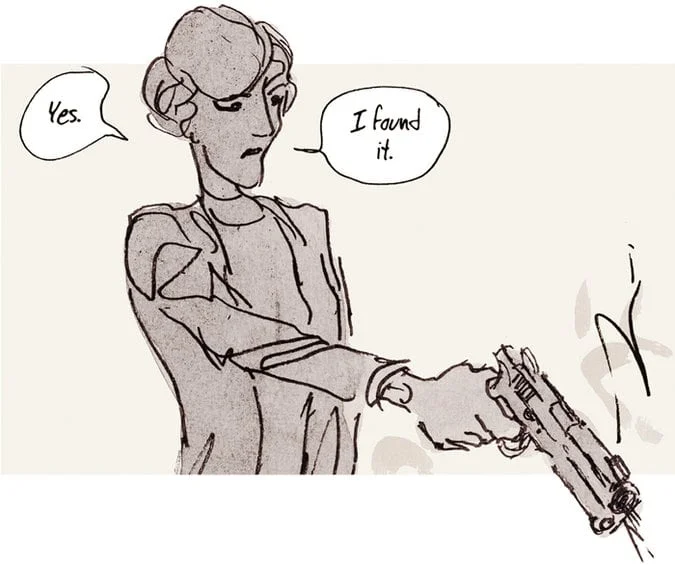
Adaptations
Munro, an animated cartoon based on Feiffer’s story, was produced by Rembrandt Films, 1961; The Apple Tree, a musical by Jerry Bock and Sheldon Harnick, contains a playlet based on Feiffer’s “Passionella,” and was produced in New York, NY, 1966; Harry, the Rat with Women was adapted as a play produced at the Detroit Institute of Arts, 1966; Carnal Knowledge was adapted as a motion picture, Avco Embassy, 1971; Grown-Ups was adapted for film and produced by PBS-TV, 1986; Popeye, the Movie Novel, based on Feifer’s screenplay, was edited and adapted by Richard J. Anobile, Avon, 1980; Bark, George was adapted as an animated film narrated by John Lithgow, Weston Woods, 2003.
Work In Progress
A full-length animated film for Sony Pictures.
Sidelights
Decades before he published his first self-illustrated children’s book in 1993, Pulitzer Prize-winning cartoonist Jules Feiffer was well known to young readers as the illustrator of Norman Juster’s classic 1961 novel The Phantom Tollbooth.
During the intervening years, he was known to adult readers as the creator of satiric cartoons published in hundreds of newspapers, while his plays have appeared on numerous stages and several, with the artist/playwright’s screenplays, have been adapted for film. In the early 1990s Feiffer came full circle, beginning a new phase of his career as a children’s book author, and with books such as By the Side of the Road and The House Across the Street, has won new fans through his sketchy pen-and-ink drawings and quirky texts.
Born in the Bronx, New York, in 1929, Feiffer was the son of a Polish mother and a father whose unsuccessful business ventures caused money worries to haunt the Feiffer household. The trials of the Great Depression did not help matters in the Feiffer home, and young Jules reacted by escaping into books—more specifically comic books such as “Detective Comics”—and drawing. When Feiffer was approximately seven years of age, he won a gold medal in an art contest sponsored by a New York department store.
Knowing that a good job would help him avoid the financial plight of his parents, he decided to become a cartoonist. As Feiffer recalled in The Great Comic Book Heroes: “I . . . drew sixty-four pages in two days, sometimes one day stapled the product together, and took it out on the street where kids my age sat behind orange crates selling and trading comic books. Mine went for less because they weren’t real.”
Feiffer studied the comic strips in the pages of the New York Times and the World-Telegram his father brought home after work, salvaged newspapers from garbage cans, and got friends to bring him the comics sections from the newspapers their parents discarded. “To see ‘Terry and the Pirates,'” Feiffer explained, “we’d have to get the Daily News, which my family wouldn’t allow in the house.” The reason: his parents–both Jewish and both Democrats–believed that the publisher of the New York Daily News was anti-Semitic.
At age fifteen Feiffer enrolled at the Art Students’ League, then studied at the Pratt Institute for a year, taking night courses. Meanwhile, in 1946, through a stroke of luck, he became an assistant to noted cartoonist Will Eisner. “He said I was worth absolutely nothing, but if I wanted to hang out there, and erase pages or do gofer work, that was fine,”
Feiffer recalled to Gary Groth in Comics Journal. Eisner eventually assigned Feiffer the writing and layout for the comic strip “The Spirit,” and in exchange let his young apprentice cartoonist have space on the last page of his current strip. Thus, the “Clifford” comic strip was born.
“Clifford” came to a close in 1951, when Feiffer was drafted into the U.S. Army during the Korean War. His experiences as part of the military provided Feiffer with the subject he would satirize for most of his remaining career: the workings of the U.S. government. “It was the first time I was truly away from home for a long period,”
Feiffer explained to Groth, “and thrown into a world that was antagonistic to everything I believed in, on every conceivable level. In a war that I was out of sympathy with, and in an army that I despised; [an army that] displayed every rule of illogic and contempt for the individual and mindless exercise of power. [That] became my material.”
Released from duty in 1953, Feiffer was at work creating a weekly comic strip for the Village Voice by 1956. “We cut a stiff deal,” the cartoonist recalled to a writer for Dramatists Guild Quarterly of his early attempt to get published. “They would publish anything I wrote and drew as long as I didn’t ask to be paid.” As he planned, Feiffer got a call from an editor at a different publication, who, as the cartoonist recalled, “said, ‘oh boy, this guy is good, he’s in the Voice, ‘ and accepted the same stuff his company had turned down when I had come to their offices as an unpublished cartoonist.”
With the security of regular cartoon assignments, Feiffer could now refine his style, which was already influenced by the work of illustrator William Steig. By the late 1950s, his cartoons appeared regularly in Playboy, the London Observer, and in newspapers across the United States.
Many of these strips have been collected in books such as Feiffer’s Album, Feiffer on Nixon, and Feiffer’s Children. In 1986 Feiffer was honored with a Pulitzer Prize for editorial cartooning. He continued to create comic strips regularly for several decades, finally ending his syndicated comic strip in the summer of 2000.
While working as a syndicated cartoonist, Feiffer also began penning plays, and his first drama, Little Murders, was produced on Broadway in 1967. The play was a popular and critical success, winning an Outer Critics Circle Award and a Village Voice Off-Broadway Award, among others.
Through the 1980s Feiffer wrote several other plays, as well as several screenplays that were produced as major motion pictures. His film Popeye, starring Robin Williams, was released in 1980, and his stage works, which include the autobiographical Grown-ups, The White House Murder Case, and A Bad Friend, have been produced both in the United States and in Europe.
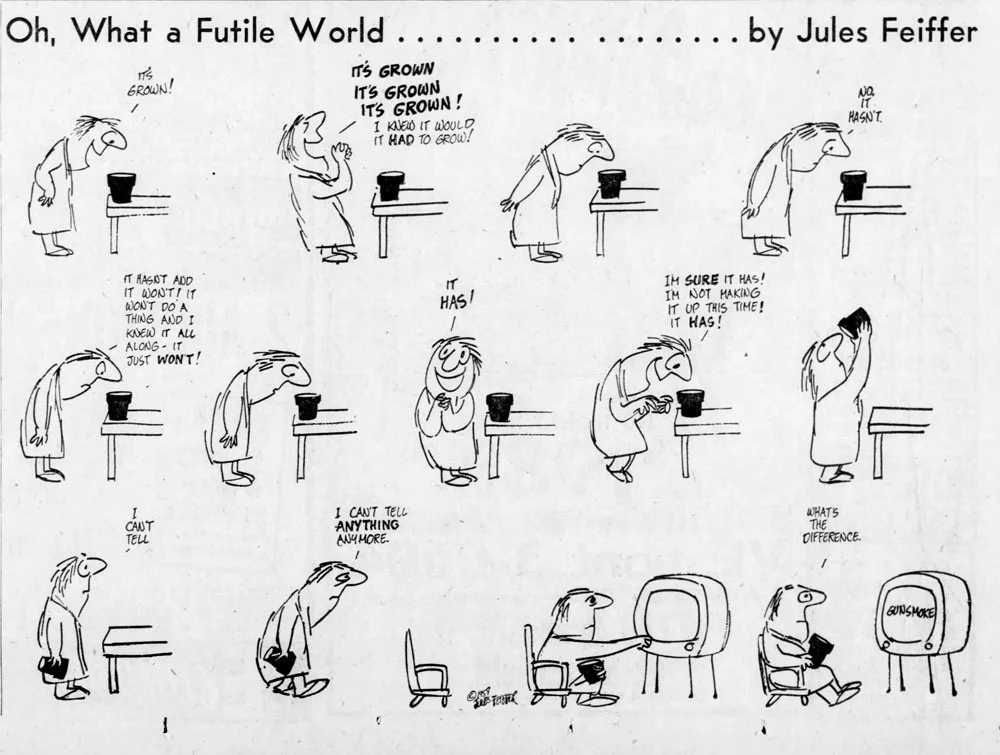
Feiffer’s debut as a children’s author came in the early 1990s with The Man in the Ceiling, a story about ten-year-old Jimmy Jibbett and his efforts to win the friendship of the popular Charlie Beemer by expressing a willingness to translate Charlie’s stories into cartoons. Cathryn M. Camper noted in Five Owls that The Man in the Ceiling “recognizes that a large part of the formation of an artist takes place in his or her youth. . . . Feiffer conveys . . . this with a sense of humor, combining samples of Jimmy’s comics to help tell the tale.”
Some of Feiffer’s children’s books feature their creator’s characteristic mature satire even as they entertain younger readers with a humorous tale. His A Barrel of Laughs, a Vale of Tears was described by a Publishers Weekly contributor as “a sophisticatedly silly fairy tale that relaxes storytelling conventions.” The topic of road rage prompted by long-distance family auto trips is the focus of By the Side of the Road, which finds the parents of an unruly eight-year-old making good on their threat: “If you don’t stop that now you’ll end up on the side of the road.”
Deposited on the side of the road and abandoned, the boy makes a new life for himself, is joined by another abandoned child, and grows to adulthood, occasionally visited by his family and becoming the subject of envy by his stay-at-home brother. While noting that By the Side of the Road is “really for parents,” New York Times Book Review contributor Cynthia Zarin wrote that Feiffer “is in top form here.”
Feiffer turns to more traditional tales for children with Meanwhile . . . , The Daddy Mountain, and Bark, George, the last a reversal of the old-lady-who-swallowed-a-fly story. Meanwhile. .draws on a fantasy tradition of a modern sort, as comic-book fan Raymond, pursued by his angry mother, decides to pull the “Meanwhile. . .” dialogue balloon out of his comic book to see if it will transport him somewhere else in a hurry.
“Frantic action and the clever theme make this a great read-aloud,” concluded School Library Journal contributor Lisa S. Murphy. In The Daddy Mountain, which narrates a small girl’s successful attempt at a daunting ascent up onto her father’s shoulders, the author captures what Booklist reviewer Jennifer Mattson described as “daddies’ special fondness for roughhousing” in illustrations that “are vintage Feiffer,” according to Grace Oliff in School Library Journal.

A young dog who goes “meow” instead of “arf” is the focus of Feiffer’s award-winning Bark, George, which finds the pup’s distressed mother hurrying her son off to the local vet to find the source of the problem: he has swallowed a cat. Praising Bark George as the “pairing of an ageless joke with a crisp contemporary look,” a Publishers Weekly contributor dubbed Feiffer’s simply drawn illustrations “striking” and “studies in minimalism and eloquence.”
Booklist reviewer Stephanie Zvirin praised Feiffer’s “easy to follow” text and added that the author/illustrator’s “characters are unforgettable . . . and the pictures burst with the sort of broad physical comedy that a lot of children just love.”
I’m Not Bobby finds a young boy determined to be someone else. Refusing to respond to calls for Bobby, he pretends to be a horse, a car, a dinosaur, a giant, and even a space ship to tune out his mother’s calls. Finally, dinner time and fatigue make being Bobby by far the best option, in a book that features “Feiffer’s exuberantly drawn signature illustrations,” according to a Horn Book contributor.
Dissatisfaction is also the subject of The House Across the Street, which finds a young boy wishing he lived in the larger house of a neighborhood friend. While imagining that a wealth of wonderful toys, fabulous dogs, and even a dolphin-filled swimming pool must exist in that amazing house, the boy also conjures up a family in which parents never fight, happy friends come and go, and the house rings with laughter, giving The House across the Street a poignant note while it also captures the whining note of many a “common childhood tune,” according to a Kirkus reviewer.
Noting that Feiffer captures “a child’s anger about . . . adult authority,” Booklist contributor Hazel Rochman praised the book for also expressing “a child’s loneliness and his soaring imaginative power.”
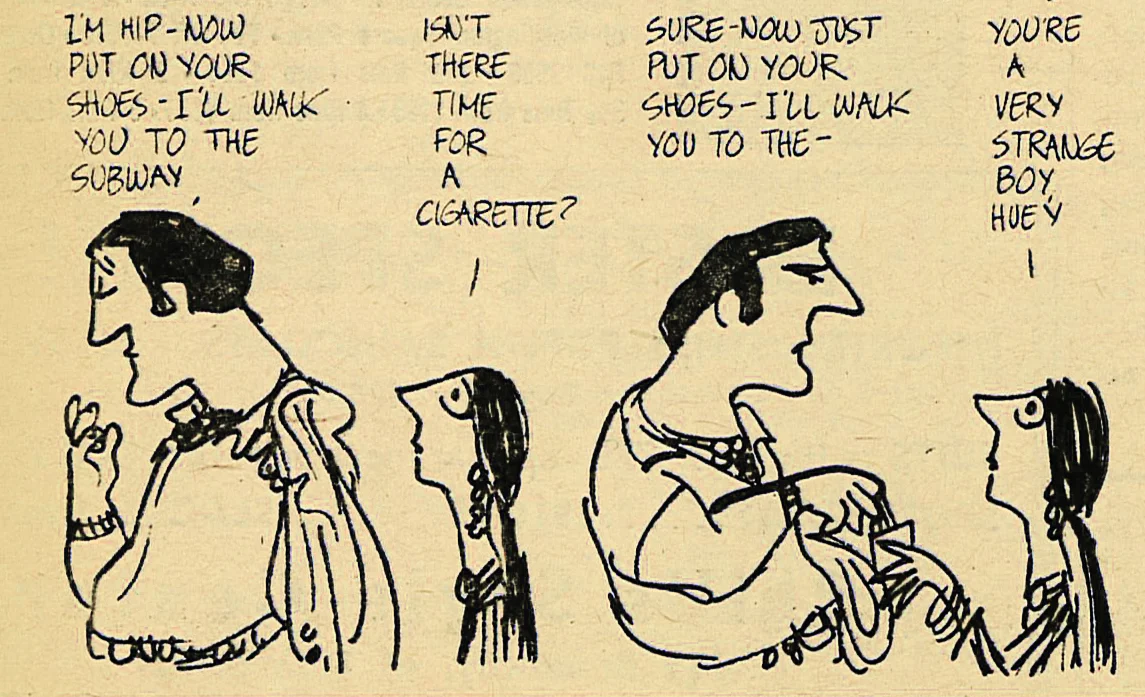
Biographical And Critical Sources
BOOKS
Cohen, Sarah Blacher, editor, From Hester Street to Hollywood: The Jewish-American Stage and Screen, Indiana University Press (Bloomington, IN), 1983.
Contemporary Dramatists, 5th edition, St. James Press (Detroit, MI), 1993.
Contemporary Literary Criticism, Volume 64, Gale (Detroit, MI), 1991.
Dictionary of Literary Biography, Gale (Detroit, MI), Volume 7: Twentieth-Century American Dramatists, 1981, Volume 44: American Screenwriters, 1986.
DiGaetani, John L., editor, A Search for a Postmodern
Theater: Interviews with Contemporary Playwrights, Greenwood Press (New York, NY), 1991.
Encyclopedia of World Biography, 2nd edition, Gale (Detroit, MI), 1998.
Feiffer, Jules, The Great Comic Book Heroes, Dial (New York, NY), 1965.
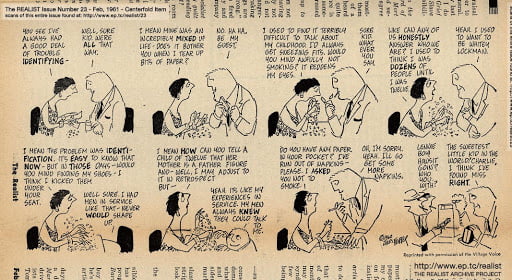
PERIODICALS
American Theatre, May-June, 2003, “Twenty Questions: Jules Feiffer,” p. 88.
Back Stage, June 27, 2003, Irene Backalenick, review of A Bad Friend, p. 48.
Booklist, November 15, 1993, Elizabeth Bush, review of The Man in the Ceiling, p. 620; December 1, 1997, Stephanie Zvirin, review of Meanwhile . . . , p. 636; August 19, 1999, Stephanie Zvirin, review of Bark, George, p. 2052; June 1, 2002, Hazel Rochman, review of By the Side of the Road, p. 1742; December 1, 2002, Hazel Rochman, review of The House across the Street, p. 673; May 1, 2004, Jennifer Mattson, review of The Daddy Mountain, p. 1562.
Bulletin of the Center for Children’s Books, December 1993, pp. 120-121; February 1996, p. 189.
Comics Journal, August 1988, Gary Groth, “Memories of a Pro Bono Cartoonist”; winter, 2004, “A Thirst for Storytelling.”
Dramatists Guild Quarterly, winter, 1987, Christopher Duran, “Jules Feiffer, Cartoonist-Playwright.”
Editor & Publisher, May 31, 1986, David Astor, “An Unexpected Pulitzer for Jules Feiffer;” May 29, 2000, Dave Astor, “Feiffer Focus No Longer on Syndication,” p. 35.
Five Owls, January-February, 1994, Cathryn M. Camper, review of The Man in the Ceiling, pp. 66-67.
Horn Book, September-October, 1997, p. 557; March-April, 1998, Lauren Adams, review of I Lost My Bear, p. 212; January 2001, review of Some Things Are Scary, p. 83; November-December, 2001, review of I’m Not Bobby!, pp. 735-736; May-June, 2002, Kristi Beavin, review of The Man in the Ceiling, p. 353; May-June, 2004, Joanna Rudge Long, review of The Daddy Mountain, pp. 310-311.
Kirkus Reviews, July 15, 1997, p. 1110; March 15, 1998, p. 402; November 1, 2002, review of The House across the Street, p. 1611; April 1, 2004, review of The Daddy Mountain, p. 328.
Library Journal, July 2003, Steve Raiteri, review of The Great Comic Book Heroes, pp. 69-70.
Los Angeles Times, September 30, 1993, Lawrence Christon, “Jules Feiffer Fine-toons His Career,” p. E1; June 17, 2000, John J. Goldman, “Swan Song for Feiffer’s Dancer,” p. D1.
New Leader, July-August, 2003, Stefan Kanfer, “Family Affairs,” pp. 41-43.
New York Post, May 26, 2002, “Still Quick on the Draw,” p. 62.
New York Times, May 29, 1997, Elisabeth Bumiller, “Jules Feiffer Draws the Line at No Pay from The Voice, ” p. B1; January 23, 2000, Josh Schonwald, “Laughs and Learning with Jules Feiffer,” p. P2; June 17, 2000, Sarah Boxer, “Jules Feiffer, at Seventy-one, Slows down to a Gallop,” p. B1; March 4, 2003, Mel Gussow, “Jules Feiffer, Freed of His Comic Strip Duties, Finds a New Visibility,” p. E1; June 10, 2003, Bruce Weber, “Uncle Joe Smiles down on a Family of Old Lefties,” p. E1.
New York Times Book Review, November 14, 1993, Jonathan Fast, review of The Man in the Ceiling, p. 57; December 31, 1995, Daniel Pinkwater, review of A Barrel of Laughs, a Vale of Tears; March 15, 1998, Constance L. Hays, review of Meanwhile . . . , p. 24; May 17, 1998, Krystyna Poray Goddu, review of I Lost My Bear, p. 22; August 15, 1999, review of Bark, George, p. 24; November 19, 2000,
Jeanne P. Binder, “Things That Go Squish in the Night,” p. 44; November 18, 2001, Dwight Garner, “‘Better Not Call Me Again. I’m a Monster,'” p. 25; September 29, 2002, Cynthia Zarin, “The Boy Who Willed One Thing,” p. 27; October 29, 2002, Cynthia Zarin, review of By the Side of the Road; June 8, 2003, Andrea Stevens, “Jules Feiffer’s Communist Manifesto,” p. 5; June 27, 2004, p. 14.
New York Times Magazine, May 16, 1976, Robin Brantley, “‘Knock Knock’ ‘Who’s There?’ ‘Feiffer'”; June 15, 2003, Deborah Solomon, “Playing with History,” p. 13.
Print, May-June, 1998, Steven Heller, interview with Feiffer, pp. 40-41; May-June, 1999, Carol Stevens, “Baby Teeth,” p. 50; September 2000, Steven Heller, “Feiffer’s Last Dance,” p. 26.
Publishers Weekly, October 25, 1993, review of The Man in the Ceiling, p. 62; November 27, 1995, review of A Barrel of Laughs, a Vale of Tears, p. 70; January 26, 1998, review of I Lost My Bear, p. 91; June 21, 1999, review of Bark, George, p. 66; October 2000, review of Some Things Are Scary, p. 76; August 20, 2001, review of I’m Not Bobby, p. 78; May 13, 2002, review of By the Side of the Road, p. 69; October 14, 2002, review of The House across the Street, p. 82; June 30, 2003, review of The Great Comic Book Heroes, p. 59; April 5, 2004, review of The Daddy Mountain, p. 60.
Quill & Quire, November 1993, p. 40.
School Library Journal, January 1996, p. 108; September 1997, Lisa S. Murphy, review of Meanwhile . . . , p. 180; March 1998, Julie Cummins, review of I Lost My Bear, p. 179; September 1999, p. 182; January 1, 2001, Maryann H. Owen, review of Some Things Are Scary, p. 101; November 2001, review of I’m Not Bobby!, pp. 119-120; May 2002, Wendy Lukehart, review of By the Side of the Road, p. 152; February 2003, Wendy Lukehart, review of The House across the Street, p. 111; May 2003, Steve Weiner, “A Found Feiffer,” p. 33; June 2004, Grace Oliff, review of The Daddy Mountain, p. 108.
Time, May 21, 2001, Francine Russo, “A Matter of Medium,” p. G8.
Read also: William Ellis Green (1923 – 2008)
FAQs About Jules Feiffer
1. Who is Jules Feiffer?
Jules Feiffer is an American cartoonist and author known for being one of the most widely-read satirists in the United States. He has significantly contributed to cartoons, plays, screenplays, and children’s books.
2. What are some of Jules Feiffer’s notable achievements?
- As the United States’s leading editorial cartoonist, Jules Feiffer won the Pulitzer Prize in 1986.
- In 2004, he was inducted into the Comic Book Hall of Fame.
- Feiffer wrote the animated short film “Munro,” which won an Academy Award for Best Animated Short Film in 1961.
3. What is Jules Feiffer’s career background as a cartoonist?
- Feiffer began his career as an assistant to cartoonist Will Eisner, where he helped write and illustrate comic strips, including “The Spirit.”
- In 1956, he became a staff cartoonist at The Village Voice, producing the weekly ” Feiffer ” comic strip for over four decades.
- His cartoons became nationally syndicated in 1959 and appeared in various publications, including The New Yorker, Playboy, and The Nation.
4. What is Jules Feiffer’s contribution to literature?
- Jules Feiffer has authored over 35 books, including satirical collections, novels, and children’s books.
- Notable works include “Sick, Sick, Sick: A Guide to Non-Confident Living,” “The Explainers,” and “Feiffer’s Children.”
5. Has Jules Feiffer been involved in the theater and film industry?
- Yes, Feiffer ventured into playwriting and screenwriting with works like “Little Murders,” “Knock Knock,” and the screenplay for “Carnal Knowledge.”
- He also wrote a musical adaptation of his book “The Man in the Ceiling.”
6. What is Jules Feiffer’s role as an art instructor?
- Jules Feiffer has taught at various institutions, including the Yale School of Drama, Northwestern University, and Stony Brook Southampton.
- He has been a Senior Fellow at the Columbia University National Arts Journalism Program.
7. What is Jules Feiffer’s personal life?
- Jules Feiffer has been married three times and has three children, including actress and playwright Halley Feiffer and author Kate Feiffer.
- His third marriage in 2016 incorporated Jewish and Buddhist traditions and was to freelance writer JZ Holden.
8. Where can I find Jules Feiffer’s work?
- Jules Feiffer’s cartoons and illustrations have been widely published in newspapers, magazines, and books.
- His work can also be found in retrospectives at institutions like the New York Historical Society and the Library of Congress.
9. What awards and recognitions has Jules Feiffer received?
In addition to winning the Pulitzer Prize and being inducted into the Comic Book Hall of Fame, Jules Feiffer received a Lifetime Achievement Award from the Dramatist’s Guild for his contributions to theater.
10. What is Jules Feiffer currently working on?
Jules Feiffer is working on a visual memoir, continuing his legacy as a prolific cartoonist, author, and artist.
This post was created with our nice and easy submission form. Create your post!




